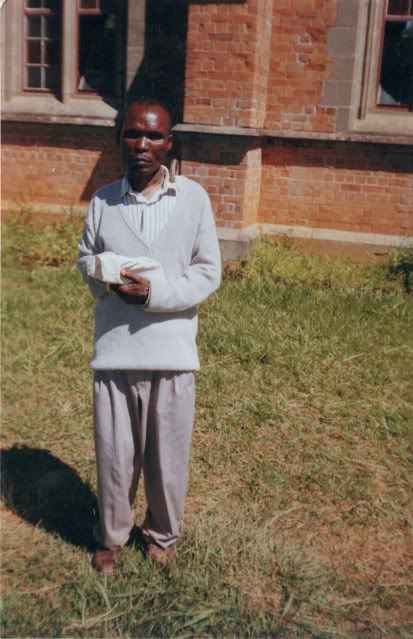Malawi, a sliver of a country south of Tanzania and north of Mozambique, was sort of a refuge from a lot of the bothers of Africa (though finding food was often an issue – often all there was to eat was bony fish soup and nsima*). Quiet, temperate, scenic, and mostly safe, Malawi was even more of a haven because you had to pass through fairly treacherous terrain just to get there. I spent a month in the tiny country and even extended my visa. About my third week in I was in Livingstonia, a tiny settlement atop a misty forested plateau, staying in a colonial home used by missionaries. One day while wandering around I was trying to get some shopping done, and wandered up to the store run by Yonum L. K. C. Mhango.
Mhango’s shop was the size of an airplane toilet, and sold the exact same thing as the other dozen stores in Livingstonia: toilet paper, mosquito coils, matches, and soap. (The endless rows of stores in places like Malawi selling identical commodities is one of the maddening sights that confronted travelers.) I don’t remember which of the four products I was shopping for, but I ended up chatting with Mhango and, like you do a dozen times a day in Africa, we exchanged addresses. The next day I was on the road again.
About six months after returning to the United States I got my first letter from Mhango. I have it but don’t need to read it as it reads practically word-for-word the same as all his subsequent letters have: “Hello Jeff. How are things in the United States? I am fine. I am hoping that some day you can come again to visit me in Livingstonia.” Mhango talks about the local crops, an upcoming holiday, the endless cycle of rain and sun that marks time in Malawi, and ends with messages of good tidings to my family. (He was then and as far as I can tell still is a single guy – pretty unusual. His right hand is slightly deformed, and I don’t know if that hurts his dating chances.)
The letters continued at a pace of about once a year, arriving in dusty airmail envelopes and on written on crinkly grade-school lined paper. One year he sent a large crudely-carved fish, with nails for eyes and a small stand which for several years sat on my desk at work and is now perched on a bookshelf at home where Cooper can eye it warily. I did the math later, converting kwacha to dollars, and was stunned to see he spent $16 to mail the package – as that’s a month’s salary I suspect he either bribed the postmaster or bought used or black market stamps. I returned a few letters but gradually lost interest as he never answered any questions or even really wrote anything different – each letter was nearly the same as the last. I also got frustrated as he never seemed to understand the concept of using a new address – since I first gave him my address I’ve probably lived in a dozen places, and his letters are always chasing my around the US despite how often I tell him I’ve moved. Nevertheless, I did reciprocate his gifts a few times with boxes of clothes, shoes, and more which I bought at first from Salvation Army and Deseret Industries and, later, from K-mart. Occasionally Mhango would ask for money for a business venture or sponsorship to come to the United States, but I brushed those requests aside and he never brought them up again.
After moving to Montana I did not hear anything from Mhango for a few years, until recently, when I started getting letters again – and emails. Yonum L. K. C. Mhango now has a gmail account and can use the village cell phone to send texts. He has also sent a few pictures, always of him alone and looking solemn and usually standing in front of Livingstonia’s grand brick church, looking neat in poor-fitting clothes, but otherwise somber and lonely.
Who knows. Maybe someday I will go back to Malawi and see the old guy.
(*Funny story about nsima: one night in a small town I was walking the restaurant row, where very simple places served plates of food to groups of mostly men who sat on plastic tables on the sidewalk. Place after place said all they had was fish soup and nsima, a staple of East Africa and similar to a bland watery heap of grits. What you did was gather a ball of nsima in your hand and dip it in the soup. I was not about to have fish soup and was pretty sick of tasteless nsima. Finally when the tenth place said all they had was soup and nsima, I exclaimed “But I hate nsima." And a random guy sitting at plastic table looked up and said, “Yes. Nsima. It’s so bad, but it’s so good.)


2 comments:
Thanks for the story. We enjoyed Malawi as well. I do recall nsima but not fondly. Malawi is a place I intend to return to someday.
Good story, Jeff. I still get occasional email & FB messages from a Kazakh/Uyghur kid who lived down the dirt road from us in Almaty. "Hello Steven. How are you? We miss you." Etc, etc.
Post a Comment